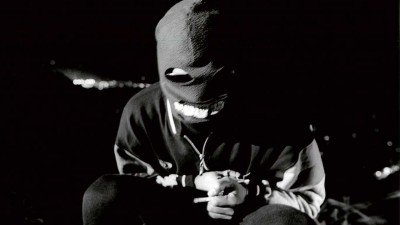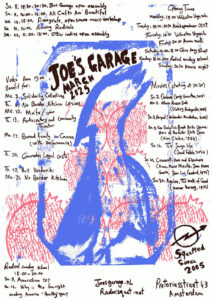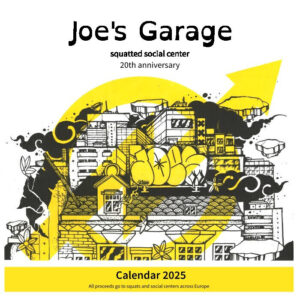Sunday May 26th 2013, Movie night with Prison Images (original title: Gefängnis Bilder, directed by Harun farocki, Germany, 2000, 60min, German with English subtitles). Notes from a Personal War (original title: Notícias de uma Guerra Particular, directed by Kátia Lund and João Moreira Salles, Brazil, 1999, 57min, Portuguese with English subtitles). Door open at 20pm, films begin at 21:00.
“So long as every institution of today, economic, political, social, and moral, conspires to misdirect human energy into wrong channels; so long as most people are out of place doing the things they hate to do, living a life they loathe to live, crime will be inevitable, and all the laws on the statutes can only increase, but never do away with, crime. What does society, as it exists today, know of the process of despair, the poverty, the horrors, the fearful struggle the human soul must pass on its way to crime and degradation.” (emma goldman)
Prisons, courts, police, laws and the negative notion of “crime” are mere social constructs. They are developed by people and institutions (composed of people) that exercise power above others (no matters if in cleptocratic fashion or “authorized” by elections). These constructs are necessary to maintain an arbitrary order that solely aims to protect those with power and their amenities from the powerless. They are necessary to protect private property, and as we can see in present days it is not the property of the powerless that is protected, as those get rather kicked out of their homes en mass. After all these constructs are mandatory to deter people from disposing them altogether on the scrapheap of history, to eventually live and act in solidarity, co-operation and freedom.
“Prison Images“ by Harun Farocki explicitly shows how the power exercised by the state is violently applied in prisons. Therein it becomes obvious that prison does not seek to “re-socialise” people, that it does not provide any solution for so called “crimes”, a term that purely functions as negative label and only through labelling something becomes a “crime” or someone a “criminal” in the first place. “Prison Images” gives an insight into prison as solely technocratic tool to break people, to break dissent. It is a profitable factory that exploits gratis labour. Likewise prison does not protect society itself. It merely externalizes and destroys peoples capabilities and awareness to deal with problems and to develop humane exposures.
Prison cannot be a solution for anything as we’re going to see explicitly in “Notes from a personal war”. As long as capitalism exists (and equally important: patriarchy, the notion of race and the state), as long as people are not free and do exercise power over others, the powerless will be marginalized, criminalized and locked away in prison for not playing – or being able to play – their attributed role in society:
You are criminalized – for living in informal settlements or social “hotspots” – for organizing squats and autonomous spaces – for not accepting to work under slavery conditions – for not accepting repressive measures of the so called welfare system – for occupying land to grow foot instead of starving – for not having money to pay public transport – for not accepting deprecated concepts of togetherness – for daring to enter Europe without papers, or for just coming from the “wrong” country – for daring to refuse to cooperate with the state – for having a skin colour that does not fit into the constructed social norm (this list is probably miles long).
As long as social inequality exists and is further enforced (as emphatically shown by the two documentaries but also to be experienced in the daily crisis), being criminalized is the norm and any form of resistance and dropping-out is labelled as “crime”.
The movies that are screened tonight invite us to realise humane alternatives that abolish the current violent (penal) system, that is directed against the gross of the people worldwide.
More and broader informations about the social construction of prison, law and criminalisation can be found under the following links (much more elaborated then this short announcement):
Prisons: a social crime and failure
http://dwardmac.pitzer.edu/anarchist_archives/goldman/aando/prisons.html
Law and authority
http://dwardmac.pitzer.edu/anarchist_archives/kropotkin/lawauthority.html
Labeling theory
https://en.wikipedia.org/wiki/Labeling_theory
Repression and social movements
http://www.interfacejournal.net/2011/05/interface-volume-3-issue-1-repression-and-social-movements/
Prison Images (Gefängnisbilder)
A film composed of images from prisons. Quotes from fiction films and documentaries as well as footage from surveillance cameras. A look at the new control technologies, at personal identification devices, electronic ankle bracelets, electronic tracking devices. The cinema has always been attracted to prisons. Today’s prisons are full of video surveillance cameras. These images are unedited and monotonous; as neither time nor space is compressed, they are particularly well-suited to conveying the state of inactivity into which prisoners are placed as a punitive measure. The surveillance cameras show the norm and reckon with deviations from it. Clips from films by Genet and Bresson. Here the prison appears as a site of sexual infraction, a site where human beings must create themselves as people and as a workers. In Un Chant d’amour by Jean Genet, the guard looks in on inmates in their cells and sees them masturbating. The inmates are aware that they are being watched and thus become performers in a peep show. The protagonist in Bresson’s Un Condamné à mort s’est échappé turns the objects of imprisonment into the tools of his escape. These topoi appear in many prison films. In newer prisons, in contrast, contemporary video surveillance technology aims at demystification. (Harun Farocki)
Notes from a personal war (Notícias de uma guerra particular)
All those who have seen Brazilian film “City of God” will feel illuminated to learn that this highly original documentary film was the inspiration for it.If a violent film like “City of God” was appreciated for being an outstanding fiction film,Notícias de uma Guerra Particular would also be regarded highly as an honest visual document about everyday violence which takes it toll on the residents of Favelas in Rio de Janeiro,Brazil.The film is multidimensional and we get to hear many views of people from all walks of life.We hear what police,drug dealers,drug addicts and Favela residents have to say. There is hardly any blame game which takes place in this film as Katia Lund and João Moreira Salles do not take sides.They show us images which are true to themselves.
Film night at Joe’s Garage, warm and cozy cinema! Doors open at 20:00, film begins at 21:00, free entrance. You want to play a movie, let us know: joe [at] squat [dot] net




